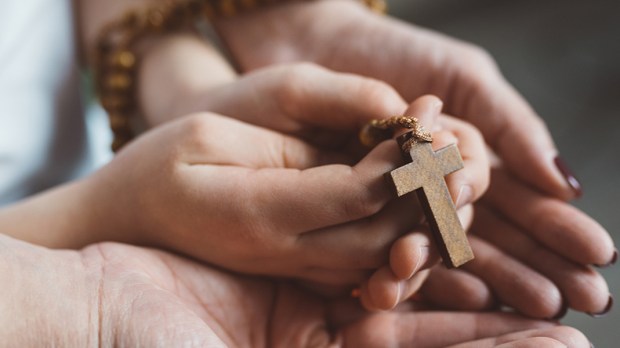“I want them to be able to make up their own minds about religion without any pressure from me.”
It’s a common statement these days. Many parents are refusing to teach their children about religion in any form. In a way, I sympathize. These same parents talk about their own religious upbringing in hushed tones fraught with emotional baggage. They have bad memories of religion being pushed on them from a very young age by overbearing pastors and restrictive moral codes that brooked no argument. The result was that, once they’d attained the freedom of adulthood, they flew as far as they could from organized religion. Although some of these adults — and this is purely my anecdotal experience — still consider themselves “spiritual,” they have a lot of trouble with the concept of organized religion and don’t want to force their own children to adhere to their beliefs. It seems to them like a bad parenting move.

Read more:
A CCD teacher’s top 5 ways to keep teens interested in God
My own experience with religion growing up wasn’t nearly as disastrous, and I know that there are many parents who have no complaints at all. But even among this group there can be some hesitation to seem controlling when it comes to teaching their children about faith. In fact, this seems to be the majority opinion. A recent poll at debate.org asked the question, “Is teaching children religion brainwashing?” The response was an overwhelming 86 percent replying in the affirmative — yes, teaching religion to children is brainwashing.
As a father of five, my wife and I face the question of teaching our children religion on a daily basis. Should we teach them to pray? Have them memorize scripture verses? Have them participate in First Communion and learn the Catechism? For us, the answer was never in doubt — of course!
Here are our reasons why we teach — not brainwash — our children religion:
So they learn to make reasonable choices
One of the assumptions about religion is that it removes our ability to be rational. Because of this, parents think that teaching religion harms their child’s ability to think clearly and make good decisions. Speaking only of my own religion, Catholicism, this definition of religious faith as being incompatible with rationality is inaccurate. In fact, Catholicism staunchly defends the use of reason. Pope St. John Paul II puts it beautifully when he teaches, “Faith and reason are like two wings on which the human spirit rises.”
Teaching our children religion doesn’t take away their ability to make rational choices. In fact, not teaching them religion is what restricts their ability to choose their own path. Joe Heschmeyer comments at Word On Fire: “If you had a child and decided not to teach them how to speak (so that they could choose a language on their own as adults) you would be an awful parent.”
The point is, one of the main duties of parents is to teach their children, to give them a basic outlook on life. We teach them how to eat healthy, how to treat others respectfully, and how to behave in public. We send them to school, introduce them to sports, and involve them in our hobbies. Later, when they’re adults, they will have a great storehouse of information that will serve as the building blocks of their own, individual choices. But if we refused to teach them any of these things because of fear it would bias them and remove their ability to be rational, they would actually be severely limited and unprepared for life. Why would religion be any different? It’s important that children know about religion so that once they’re adults they have the basic facts and experience they need to form their own religious habits.
To bring them into a supportive community
I wonder if some of us don’t take our own childhoods in a strong religious community for granted. Even those who have since rejected religion are probably still benefiting from the self-confidence and sense of being safe that allowed them make such a bold decision.
Read more:
Works of mercy from the 4th grade
Faith traditions ground us. They tell us who we are and give us confidence to strike out on our own, knowing that there is always the solid ground of the faith community to catch us if we fall. Without that community, it’s all too easy to feel isolated and afraid to engage in the world. Growing up, I was raised Protestant, not Catholic, but it was my strong Protestant religious community that gave me the confidence to make my own choice. To this day, I’m appreciative that my parents taught me about religion.
So they know they are loved
I try to my hardest to be the best father possible to my children, but I admit that I have bad days. I sometimes raise my voice, or am too tired to play games with them, or punish them too harshly, or fail to express my love adequately. Sadly, this is the human condition and, try as we might, we let each other down from time to time. So, if parents aren’t perfect and there are times when I’m too angry with my children, or they don’t feel like I understand them, when I can’t love them the way they deserve to be loved, who will give them what they need? There’s only one answer: God.
God’s love is perfect. He is the perfect father when I am not. I want my children to know they are loved no matter what, no matter what difficulty our relationship falls into. Whatever struggles they encounter as they grow up, there will always be a steady, faithful relationship with the God who loves them. As a parent, it’s my duty to introduce my children to this relationship and help them to cultivate it. After that, they’re free to make their own choices. My parents did the same for me and I am deeply grateful. It’s now my turn to pass on this precious gift to the next generation.

